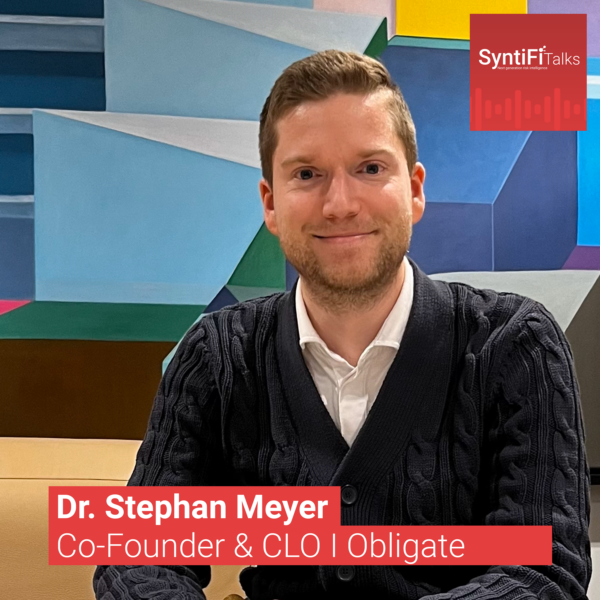
Series 2 #1: Dr. Stephan Meyer: How secure is blockchain based debt?
Dr. Stephan Meyer, Co-Founder & Chief Legal Officer | Obligate, Switzerland
2023
About the Episode
In this episode Remo Stieger sat down with Dr. Stephan Meyer, Co-Founder and Chief Legal Officer of Obligate, to discuss various risks for Decentralized Finance (DeFi) and to lay out how to mitigate operational and money laundering risks related to digital assets and digital asset transactions. The challenges of threading the needle between privacy and financial integrity in crypto regulation are explored as well as well as who should be responsible and ensure accountability in a decentralized world.
About Obligate: With the Obligate platform, companies can issue on-chain bonds and commercial paper to obtain funding from a diverse range of investors. This comes at a fraction of the cost and time of traditional offerings but with the same regulatory certainty, as the instruments are globally enforceable, regulated debt securities. At the same time, investors get access to a wide range of regulated digital debt assets which can be secured with on-chain collateral. Utilizing smart contracts and tokenization in place of intermediaries such as paying and issuer agents, Obligate is able to reduce the costs associated with a bond issuance by 80% and reduce the time needed for an issuance from weeks to hours.
This episode is hosted by Remo, Co-Founder & Partner SyntiFi

About Dr. Stephan Meyer
Dr. Stephan Meyer is a Swiss attorney-at-law, entrepreneur, lecturer and researcher specialized in the legal and regulatory implementation of blockchain-projects. After multiple positions with an insurance company he has been a member of an interdisciplinary Swiss National Science Foundation research project on the regulation of virtual currencies at ZHAW School of Management and Law. Stephan wrote a PhD dissertation on private and securities law qualification of blockchain-based crypto tokens at University of Zurich (summa cum laude, Issekutz-Prize 2020). Currently, Stephan is Co-Founder as well as Chief Legal Officer with Obligate, a fintech company based in Switzerland creating a hub for tokenized bonds, and Counsel with the crypto team of MME, a leading DLT law firm. He advises on tokenization, DLT trading facilities and decentralized governance. Finally, Stephan is co-founder of the European thinkBLOCKtank, lecturer in blockchain & law at ZHAW School of Engineering and University of Lucerne, as well as an active legal advisor in the rank of a major within the Swiss Armed Forces.
Timestamps
- 0:42: Welcome by Remo (host) & intro
- 1:37: Stephan, please introduce yourself & your role with Obligate
- 2:58: Why did you start engaging in topics related to new technologies and what is a convincing use-case for blockchain in your point of view?
- 5:02: Traditional vs Blockchain based debt – what are the differences and what are the advantages of a blockchain based system?
- 7:57: How can businesses use Obligate and how can they access it?
- 9:04: Blockchain allows self-custody without an intermediary. How secure do you think is Blockchain technology?
- 12:26: In decentralized worlds, who should be in the end responsible and ensuring the accountability, who should enforce regulations? Is it the user, the developer, the operator or centralized authority bodies?
- 16:46: In terms of regulation, can Obligate be accessed from any juristiction?
- 18:05: According to your website, your instruments are globally enforceable. How do you guarantee the enforceablility?
- 20:35: How do you deal with data privacy in a public ledger environment?
- 23:28: How do you protect your colleterals against financial crime and how is your risk related to money laundering as a digital asset service provider?
- 24:53: What is needed to prevent financial crime using blockchain technology?
- 26:13: Do you think blockchain technology should be regulated to a greater extent?
- 30:12: What was the reason to choose Polygon?
- 32:22: End of Podcast – What are the topics you spend most of your time thinking about?
- 33:58 End of Podcast remarks by Remo

![TrustSquare_hoch_cmyk_pos_white[35991] TrustSquare_hoch_cmyk_pos_white[35991]](https://www.syntifi.com/wp-content/uploads/elementor/thumbs/TrustSquare_hoch_cmyk_pos_white35991-q8v80z4f2vr54wsqv7so9ery1fhb0ugn5fghejjgm8.png)

